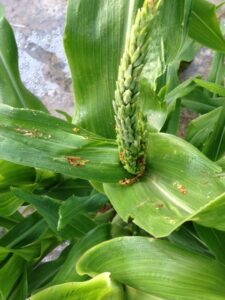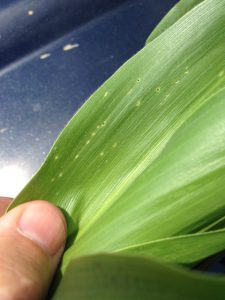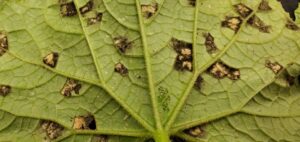Vegetable Crops Edition
Seasonal updates and alerts on insects, diseases, and weeds impacting vegetable crops. New Jersey Commercial Vegetable Production Recommendations updates between annual publication issues are included.
Subscriptions are available via EMAIL and RSS.
Quick Links:
 NJ Commercial Vegetable Production Recommendations
NJ Commercial Vegetable Production Recommendations
 Rutgers Weather Forecasting - Meteorological Information important to commercial agriculture.
Rutgers Weather Forecasting - Meteorological Information important to commercial agriculture.
IMPORTANT: EPA Issues Final Cancellation Order and Updates to Existing Stocks Provisions for Several Chlorpyrifos Products
EPA Releases Updates on Organophosphate Pesticides Dicrotophos, Dimethoate, and Tetrachlorvinphos
The Curious Case of the Virus Infected Tomato Fruit
Original Article published on 6 June 2024 by Dr. Jerry Brust, University of Maryland Extension
Ben Beale, educator from St. Mary’s County found an odd thing last week. He found in a grower’s high tunnel, tomato fruit that had the symptoms of a virus infection, but there were no foliar symptoms on any of the plants. Some fruit on a cluster had symptoms while other fruit on the same cluster looked perfectly fine. Ben had the fruit tested and got a fast response from Jill Pollok at the University of Delaware Diagnostic Clinic and it was Tomato Spotted Wilt Virus. The cultivar in question Big Beef Plus has TSWV resistance. There could be one or two possibilities for TSWV symptoms showing up in a resistant cultivar and for fruit symptoms but not any foliar symptoms of the virus.
We will look at how tomatoes can get infected by the TSWV (if you already know how this works skip down to the next paragraph). Tomato spotted wilt virus (TSWV) is an obligate parasite, i.e., it must have a living host and must be moved from one plant to another by thrips or through cuttings or possibly seed. This disease can affect tomato and other Solanaceae crops as well as lettuce, beans and cucumber. TSWV may occur in the field but tends to affect greenhouse and high tunnel crops more severely. The virus is transmitted most efficiently by Western flower thrips (WFT) (Frankliniella occidentalis), and less so by Onion thrips (Thrips tabaci), Tobacco thrips (Frankliniella fusca) and several other thrips species. It is not transmitted by Eastern flower thrips (Frankliniella tritici). Only immature thrips can acquire the virus, which they can acquire within 15 minutes of feeding, but adults are just about the only stage able to transmit the virus. Adults can transmit the virus for weeks. It may take 2 – 4 weeks from when the adult thrips first feeds on a plant until initial symptoms are observed. Because of this TSWV appears to worsen in plantings over time.
Why are we seeing fruit symptoms but little if any foliar symptoms? The most likely explanation is that TSW viruliferous thrips fed on the flowers or very young fruit. The resistance to the TSWV is expressed (active if you will) in the non-reproductive parts of the plant but not expressed to any extent in the reproductive parts (flowers and fruit) of the plant. Even though the flower and fruit can act as an entry point into the plant the resistant tomato does a good job of limiting the virus into any other areas of the plant. Thus, under low to moderate feeding pressure (1-4 thrips/flower) only the fed upon fruit or possibly a few other fruits on the same cluster become infected. The other possibility is that the TSWV resistance in Big Beef Plus is intermediate and under environmental stress it may not be ‘complete enough’ to protect all of the plant.
The first question above as to why is the virus showing up at all in a resistant cultivar can be explained by the above paragraph. But there may be another possibility although not in this particular case, that we will have to watch out for in the coming years. And that is resistance- breaking virus variants. The Sw-5b gene (Sw-5) is the most widely used resistance gene for TSWV in tomato. It not only provides resistance to TSWV but also resistance to a several associated viruses including Tomato chlorotic spot virus (TCSV) and Impatiens necrotic spot virus (INSV). The presence of the Sw-5 gene in tomato plants confers resistance to TSWV by a hypersensitive defense response that causes local lesions on the leaf, preventing the spread of the virus from the infection site through the plant. In 2022, symptoms of TSWV were observed in North Carolina tomato fields on cultivars that had the gene for TSWV resistance (Sw-5). The cultivars from different farms had symptomatic foliage and fruit. Samples were collected from both farms and subjected to sequencing to identify and confirm the presence of resistance-breaking variants, which they did. I mention this because NC is very close by, many growers get their tomato transplants from NC and because the resistance-breaking occurred in the last year or so. These resistance-breaking variants may start to show up in our fields and I am guessing that when they do, we will see 20-40% viral foliar infection and possibly worse in the fruit of resistant plants. For now, we should keep using the resistant cultivars, but watch closely for any breakdown of the resistance.
Resources: 2023. First Report of Resistance-Breaking Variants of Tomato Spotted Wilt Virus (TSWV) Infecting Tomatoes with the Sw-5 Resistance Gene in North Carolina. K. Lahre, R. Shekasteband, I. Meadows, A. E. Whitfield, and D. Rotenberg. Plant Disease vol. 107.
This article appears in Volume 15, Issue 4 of the Vegetable and Fruit News.
Vegetable IPM Update 6/19/24
Sweet Corn
European corn borer (ECB) moths continue to be captured in blacklight traps in the northern and central counties, although catches are occurring at fewer sites. The highest feeding levels are in Somerset and southern Hunterdon Counties. ECB injury is declining as infested plantings pass into the tassel stage and receive the first insecticide application. Plantings now in whorl stage are showing little feeding. While ECB has become something of a local phenomenon in NJ, growers should not assume that feeding is below economic levels in their area. ECB infestations will be present for another 1-2 weeks.
 Look for the characteristic “shot-hole” type of feeding (photo below at right) and consider treating when infested plants exceed 12% in a 50 plant sample. As plantings proceed to the pre-tassel stage, ECB larvae may be found in emerging tassels (see photo at left). It is a good idea to treat individual plantings as they move into the full tassel/first silk stage one time. This eliminates any ECB larvae that have emerged with the tassels as they begin to move down the stalk to re-enter near developing ears.
Look for the characteristic “shot-hole” type of feeding (photo below at right) and consider treating when infested plants exceed 12% in a 50 plant sample. As plantings proceed to the pre-tassel stage, ECB larvae may be found in emerging tassels (see photo at left). It is a good idea to treat individual plantings as they move into the full tassel/first silk stage one time. This eliminates any ECB larvae that have emerged with the tassels as they begin to move down the stalk to re-enter near developing ears.
Useful insecticides for this particular application include synthetic  pyrethroids (IRAC Grp 3), spinosyns (including OMRI approved Entrust) IRAC Grp 5), and diamides such as Coragen or Vantacor (IRAC Grp 28) or materials such as Besiege which include the active ingredient in Coragen. Synthetic pyrethroids alone should NOT be used for corn earworm (CEW) protection on silking corn. Control with these materials is very inconsistent.
pyrethroids (IRAC Grp 3), spinosyns (including OMRI approved Entrust) IRAC Grp 5), and diamides such as Coragen or Vantacor (IRAC Grp 28) or materials such as Besiege which include the active ingredient in Coragen. Synthetic pyrethroids alone should NOT be used for corn earworm (CEW) protection on silking corn. Control with these materials is very inconsistent.
The highest nightly trap catches of ECB for the week ending 6/19/24 are as follows:
| South Branch 3 | Farmingdale 1 | Pennington 1 |
| Califon 1 | Hillsborough 1 | Princeton 1 |
| Clinton 1 | Old Bridge 1 |
Cucurbit Downy Mildew Alert – Cucumber – 6/19/24
Cucurbit downy mildew has been confirmed on cucumber in Salem County in southern New Jersey. This is the first report of CDM in the state and region this growing season. All cucumber and cantaloupe growers should scout on a daily basis and initiate a preventative fungicide program immediately. All other cucurbit plantings need to be scouted on a regular basis. CDM was last confirmed on cucumber in central North Carolina on 6/4/24. Remember, some CDM isolates fall into Clade I which predominately infect watermelon, pumpkin, and squash, where CDM isolates in Clade II predominately infect cucumber and cantaloupe.
For more information on CDM, the clades, and CDM control please click here.

Cucurbit downy mildew sporulating on the underside of an infected cucumber leaf.
Basil downy mildew found in New Jersey – ALERT 6/18/24
Basil downy mildew has been confirmed in field grown sweet basil in central New Jersey (Hunterdon County). This is the first confirmed report of BDM in the state and region this growing season. All basil growers are encouraged to scout their fields or greenhouses on a daily basis and should consider initiating a preventative fungicide program. [Read more…]
